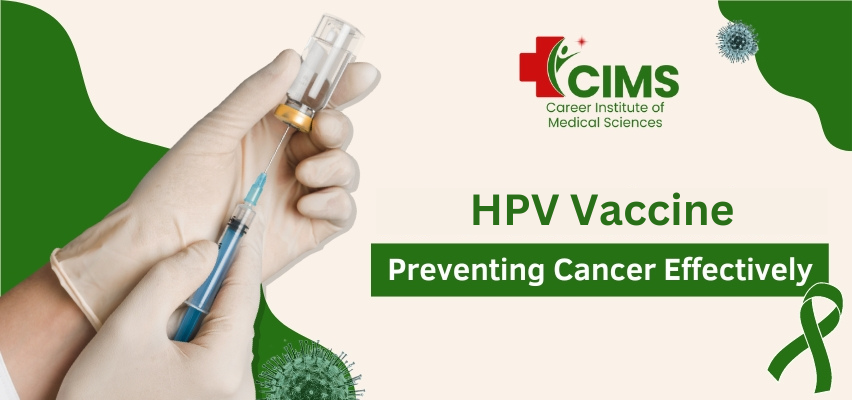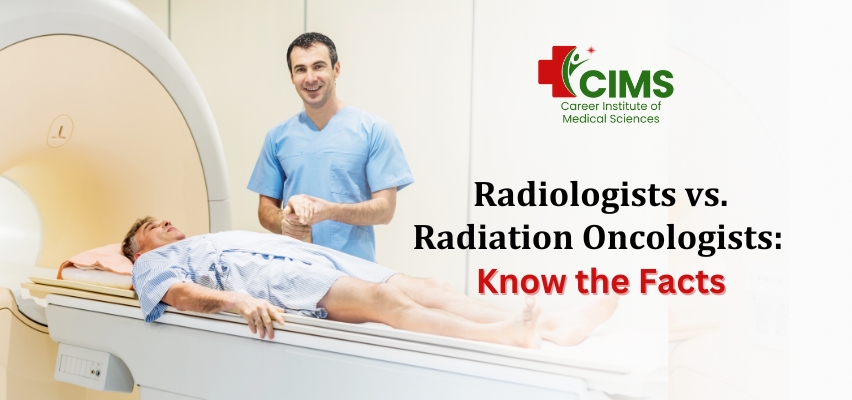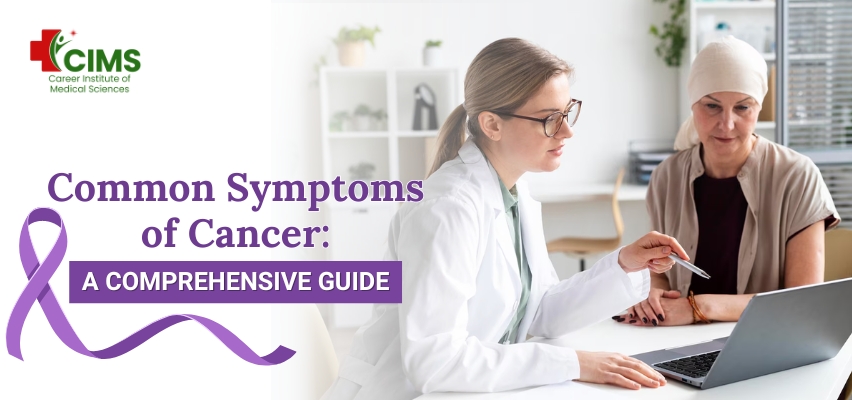Table of Contents
ToggleHPV Vaccine: Preventing Cancer Effectively
Human papillomavirus (HPV) has been linked with multiple cancers, including cervical, anal, and oropharyngeal cancers. Fortunately, the HPV vaccine is an extremely effective method for avoiding these types of cancers. The benefits of the HPV vaccine and its importance for public health are discussed in this article, and we also talk about the best hospital at Bhopal Career Institute of Medical Science (CIMS).
Quick Facts about HPV Vaccine
Fact | Details |
|---|---|
Recommended Age | 11–12 years, but can start as early as 9 years |
Gender | Recommended for all genders |
Common Side Effects | Pain at the injection site, fever, and mild headache |
Cost | Rs. 2000 to Rs. 4000 per dose in India |
Dosage Schedule | Two doses for ages 9–14; three doses for ages 15 and older |
Effectiveness | Highly effective in preventing HPV infections and related cancers |
Protection | Against HPV types causing cervical, anal, oropharyngeal, penile, vulvar cancers, and genital warts |
Types of Vaccines | Gardasil, Gardasil 9 |
Understanding HPV Vaccine
Types of HPV
Human papillomavirus (HPV) includes around 200 viruses divided into low-risk and high-risk categories. Low-risk HPVs produce genital warts, but high-risk HPVs can cause cancers.
Transmission
HPV virus spreads through intimate skin-to-skin contact, which includes genital warts. It is quite common, with almost all sexually active people catching the virus at the same point.
Symptoms
The majority of HPV virus infections are silent and resolved naturally. However, a chronic infection with high-risk HPV strains might result in cancerous tumors.
HPV and Cancer
Types of Cancers Caused by HPV virus
High-risk HPV types cause:
- Cervical Cancer: Nearly all cases are caused by HPV.
- Anal Cancer: Approximately 90% of cases are linked to HPV.
- Oropharyngeal Cancer: Increasingly common, with a significant portion caused by HPV.
- Penile and Vulvar Cancer: HPV contributes to these cancers as well.
Statistics
HPV-related cancers cause a major health burden. Cervical cancer alone kills more than 300,000 per year worldwide.
What is the HPV Vaccine?
Overview
The HPV vaccination protects against high-risk HPV types that might cause cancer. It is a preventive treatment with the potential to significantly reduce the rate of cancer.
Development
The HPV vaccination protects against high-risk HPV types that might cause cancer. It is a preventive treatment with the potential to significantly reduce the rate of cancer.
How it Works
The HPV vaccine targets the immune system to produce antibodies against the HPV virus. They include virus-like particles that mimic the immune system without causing illness.
Benefits of HPV Vaccination
Cancer Prevention
Among other cancers, HPV vaccination can reduce the chance of oropharyngeal, anal, and cervical cancer.
Herd Immunity
HPV vaccination causes herd immunity, which reduces viral circulation and protects people who are not vaccinated.
Cost-effectiveness
Vaccination is more cost-effective than treating cancer. HPV vaccination reduces medical costs related to cancer care treatment.
Types of HPV Vaccines
Gardasil
HPV types 6, 11, 16, and 18 are protected against by Gardasil. The most common HPV-related cancers are types 16 and 18, whereas genital warts are caused by types 6 and 11.
Gardasil 9
Gardasil 9 protects against nine HPV types (6, 11, 16, 18, 31, 45, 52, and 58), providing protection against cancer and genital warts.
Who Should Get Vaccinated?
Age Recommendations
The recommended age for the HPV vaccine is 1 and 12 years, however, it can be injected as early as 9 years. Catch-up vaccination might be beneficial for people up to the age of 26.
Gender Considerations
All genders are now advised to receive the HPV vaccine to guard against various types of cancer and genital warts, while it had originally been developed just to prevent cervical cancer in women.
How Effective is the HPV Vaccine?
Clinical Trials
Clinical trials confirm that the HPV vaccine is highly effective at avoiding infections with related diseases.
Real-world Data
The successful result of the HPV vaccine in reducing infections caused by HPV, genital warts, and precancerous lesions has been proven by real-world research data.
Safety of HPV Vaccine
Side Effects of HPV vaccine
Common side effects include a painful sensation at the injection site, fever, and a minor headache. Serious negative effects are quite rare.
Myths vs Facts
A lack of knowledge and misinformation about HPV vaccination causes hesitation. And a false brief that the vaccine causes infertility. It is important to clear up myths while focusing on their safety and effectiveness.
HPV Vaccination Schedule
Dosage
The HPV vaccine is given in two or three doses, as per the age at which vaccination began. Younger teenagers need two doses, while those aged 15 and over require three doses.
Timing
The second dosage is in a two-dose schedule after 6 to 12 months following the first dose. In the three-dosage schedule, the second dose is given 1 to 2 months after the first dose, and the final dose is given 6 months later.
Access to the HPV Vaccine
Global Initiatives
Organizations such as the World Health Organization and Gavi are working to improve the availability of HPV vaccines in low and middle-income countries.
Solutions
Government-funded initiatives, public awareness campaigns, and collaborations with international organizations contribute to vaccination availability and affordability.
About Career Institute of Medical Science (CIMS)
CIMS is one of the best cancer hospitals in Bhopal and Madhya Pradesh, is now the top choice for cancer treatment, and represents the most trusted cancer hospital in Bhopal. Additionally, CIMS provides a general hospital and surgical emergency cases 24*7.
CIMS, the best hospital in Bhopal M.P., has emerged as the city’s hub for advanced radiation treatment. It features modern diagnostic equipment, solid infrastructure, extra staff members, and skilled physicians.
The CIMS collaboration with Karkinos Karkinos Healthcare – A Purpose Driven Oncology Platform has transformed cancer care and will likely bring it to the top of the list of best cancer hospitals in Bhopal. It utilizes the best oncology technologies. Along with these services, CIMS is recognized as the best oncology pediatric hospital in Bhopal for more information visit the Career Institute of Medical Science (CIMS) and our official website https://www.cancerhospital.org.in/. For further details.
Conclusion
HPV vaccination is a powerful tool in cancer prevention. By preventing HPV infections, the vaccine significantly reduces the incidence of several cancers. Promoting widespread vaccination is crucial to achieving herd immunity and protecting future generations. Get vaccinated and encourage others to do the same to join the fight against HPV-related cancers.
Frequently Asked Questions (FAQs)
Q1. What is HPV vaccination?
Answer: HPV vaccination is a prevention strategy for human papillomavirus (HPV) infections, which can cause cancer and genital warts.
Q2. Who should get the HPV vaccination?
Answer: The HPV vaccination is recommended for teenagers (ages 11 to 12), however, it can be taken as early as age 9. Catch-up vaccinations are provided for individuals up to the age of 26.
Q3. How effective is the HPV vaccine?
Answer: The HPV vaccination is extremely successful in preventing infection with the HPV types it covers, considerably lowering the risk of HPV-related cancers.
Q4. Is the HPV vaccine safe?
Answer: Yes, the HPV vaccine is safe.
Q5: Can the HPV vaccine cause infertility?
Answer: No, the HPV vaccine doesn’t cause infertility. It is safe and has no negative effects on the reproductive system.
Q6: HPV vaccine cost?
Answer: The HPV vaccine is commercially available for Rs. 2000 to Rs. 4000 per dose.




Sharing is caring
Very good information…
After reading this only I understand that both gender can take this vaccination…